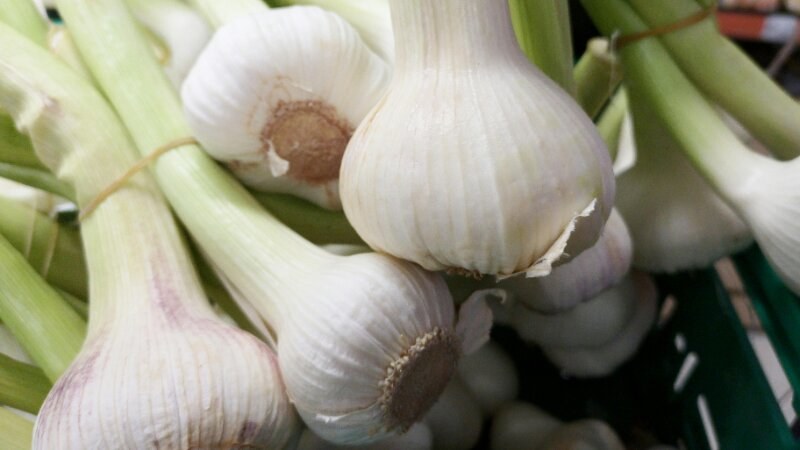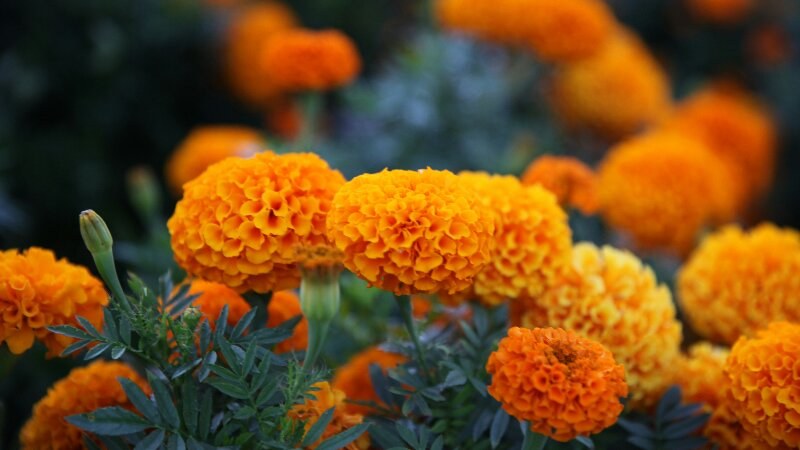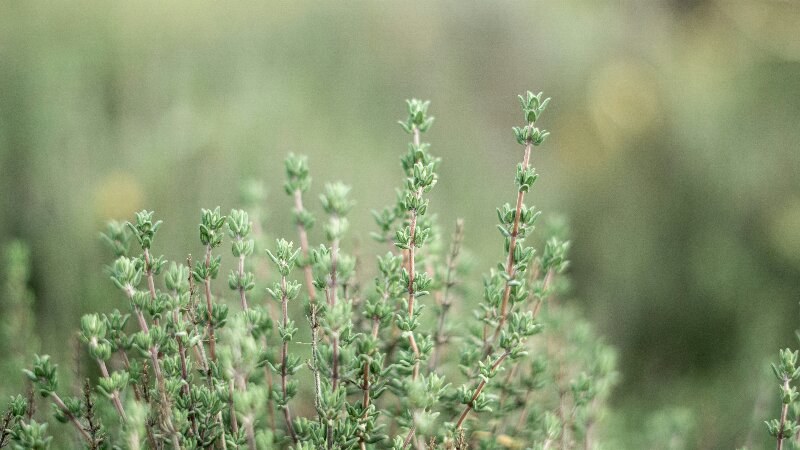Best Plants to That Can Help You Keep Pests at Bay
Reading time: 8 minutesIn the eternal battle between homeowners and pests, nature has given us a potent arsenal: plants.
While insects, rodents, and other unwanted visitors can wreak havoc on our backyards and homes, certain plants possess remarkable abilities to repel these pests naturally. By strategically incorporating these pest-repelling plants into our landscapes, we can create an ecosystem that minimizes the need for unsafe chemicals and fosters a healthier environment for plants and people.
In this guide, we explore some plants to keep pests away, offering protection for your garden and enhancing its beauty and diversity. From fragrant herbs to vibrant flowers, these guardian plants stand ready to defend your green spaces against unwanted invaders.

Allium

It is believed that plants in the allium genus, like onions, garlic, and chives, naturally repel pests due to their strong sulfuric odour, which masks the scent of other plants. When choosing which varieties of allium bulbs to plant, you'll find a wide selection available, with some blooming earlier or later in the season. For example, Allium Neapolitanum Cowanii blooms in March/April with beautiful white flowers on short stems. These can be stunning when planted along the borders and particularly useful for repelling spring aphids around rose bushes.
There's solid evidence that garlic, particularly, acts as a natural deterrent to pests. The Garlic Farm suggests companion planting garlic cloves around rose bushes. As the garlic cloves break down, they release sulphur into the soil, which roses absorb, making them less appealing to insects.
Peppermint

Ants don't like the scent of mint, especially peppermint. Ants are attracted to soft, dry, and well-aerated soil, often found beneath patio slabs. Planting peppermint nearby can keep them from these areas.
One thing to note, though, is that peppermint can spread quickly and become invasive. To control its growth, consider planting it in containers, large pots, or raised beds. This way, you can limit its root expansion. Placing these containers on or near a patio can also help keep pests away.
Keeping the soil consistently moist not only benefits the mint plant but also acts as a natural deterrent for ants. Maintaining the proper moisture levels, you'll be helping your mint thrive while keeping pesky ants at bay.
Marigolds

Marigolds are fantastic for keeping those annoying bugs away, and here's why: they have a natural compound—Thiophene, an essential oil that bugs despise. They're super handy for keeping away pests like plant lice and nematodes.
But it's not just about keeping the nasty bugs out – marigolds are like magnets for the good guys. Ladybugs, hoverflies, and parasitic wasps love hanging out around marigolds, and they're great because they chow down on the pests that marigolds scare off. It's like having your bug-fighting team right in your garden!
That's why planting marigolds alongside other plants creates a protective shield against pests while creating a cool, balanced vibe in your garden.
Citronella Grass

Citronella grass, also known as lemongrass, is nature's bug repellent. Its citrusy scent, thanks to the citronella oil it contains, masks the smells that attract bugs, making your outdoor space less appealing to them. Plus, it's safe for everyone, including pets and the environment, so you can enjoy bug-free evenings without worrying about unsafe chemicals.
Not only is citronella grass effective, but it's also easy to grow and adds a touch of beauty to your outdoor area with its slender leaves and refreshing lemon fragrance. Whether you plant it in your garden or pots on your patio, it's a low-maintenance solution that's as attractive as it is practical. Whether hosting a backyard barbecue or just relaxing in the garden, citronella grass is there to help you enjoy the excellent outdoors bug-free.
Lemongrass requires at least 6-8 hours of sun a day and fertile, free-draining soil that’s kept moist. The larger plants can be allowed to grow, the more likely they are to help get rid of mosquitoes and other pests.
Thyme

Thyme is more than a kitchen staple – it's a pretty cool bug repellent for your garden! This herb has a strong smell that bugs don't like. The best part? Thyme is a breeze to grow and care for, so you get bug protection without much fuss.
In Western Canada, certain types of thyme, like English thyme or creeping thyme, thrive in the local climate. They love soaking up the sun and chilling in well-drained soil, making them a perfect fit for your garden.
Stick them in a sunny spot and watch them do their thing, keeping those annoying bugs at bay. So, when planning your garden, think about tossing in some thyme – not just for flavour but to ward off bugs, too!
Basil

Growing basil alongside your tomatoes isn't just about culinary convenience—it's also smart for keeping pesky bugs like tomato and tobacco hornworms at bay. With their distinctive markings and horns, these little critters can wreak havoc on your tomato plants, causing serious damage.
But when you've got basil nearby, it's like having a natural bug bouncer—it helps keep these pests away, protecting your precious tomatoes and other veggies like potato, eggplant, and pepper. Plus, basil and marigolds make a charming pair, adding a touch of beauty to your veggie patch.
Pest-Proof Planting: A Quick Guide to Strategize, Group, Shift, and Trim!
Wondering how to get those plants to work their magic against pests? Here's the plan:
- Find the sweet spots – plant them strategically around your home – think doors, windows, patios, or walkways.
- Teamwork makes the dream work – stick them in groups for an extra-strong pest-deterring vibe.
- Keep it mobile – toss them in pots or containers so you can shift things around whenever you need to.
- Give them a trim – regular pruning keeps your plants in good shape and ready to tackle those pesky pests.
- Mix it up – Rotate plant varieties occasionally to prevent pests from adapting. Changing things up keeps your pest defence strategy unpredictable and effective.
FAQs about Pest Control & Exterminators
What are the most common pests found in yards?
Common pests in outdoor spaces include ants, cockroaches, spiders, ticks, rodents (such as mice and rats), aphids, mosquitoes, wasps, hornets, caterpillars, snails, slugs, and various types of beetles.
What are some natural methods for controlling pests?
Natural pest control methods include using beneficial insects like ladybugs and praying mantises, planting companion plants that repel pests (such as marigolds and basil), using barriers like row covers or mulch, practicing good garden hygiene, and employing homemade remedies like garlic spray or neem oil.
How can I prevent pests from entering my home?
To prevent pests from entering your home, seal cracks and openings around windows, doors, and utility entry points. Keep food stored in airtight containers. Maintain a clean environment by regularly clearing up spills and crumbs, and reduce moisture levels by fixing leaky faucets and using dehumidifiers. Despite that, you may still see pests in your yard, and that’s when it’s best to get on board professional pest control services.
What are some signs that I have a pest infestation?
Signs of a pest infestation can include droppings or urine stains, gnaw marks on furniture or walls, chewed food packaging, holes in clothing or fabrics, nests or burrows in hidden areas, and sightings of live pests or their shed skins.
Are there any dangers of DIY chemical pest control?
DIY chemical pest control can pose several dangers to you, your family, your pets, and the environment, such as exposure to toxic or hazardous substances, skin irritation, respiratory problems, allergic reactions, or poisoning.
Furthermore, improper use or disposal of chemical products can contaminate the soil, water, or air and harm wildlife and plants.
It’s always best to consult or hire a professional pest control service that can provide you with safe, effective, and proactive pest control solutions.
How do professional pest control and exterminator services work?
Look for a team that goes beyond traditional pest treatment. A reliable pest control company would focus on creating a customized and affordable pest prevention program for your home that includes regular inspections and treatments to ensure that your home always stays pest-free. Their technician should also be licenced and certified, so ensure you’re asking the right questions.

Your Trusted Pest Control Partner Is Here!
While plants can help you repel pests naturally, they may not be enough to solve your pest problems. Sometimes, you may need professional help to deal with stubborn or severe infestations. That’s where Buzz Boss comes in.
We're dedicated to providing fast, effective, eco-friendly pest control solutions tailored to your needs. You can trust us to keep your yard pest-free with plans and packages designed to give it the proactive protection it needs from pesky and dangerous pests.
Say goodbye to pests and hello to peace of mind by booking Buzz Boss. We serve Calgary, Edmonton, Red Deer, Regina, Saskatoon, Winnipeg, and Okanagan.
Don’t let pests ruin your outdoor enjoyment.

